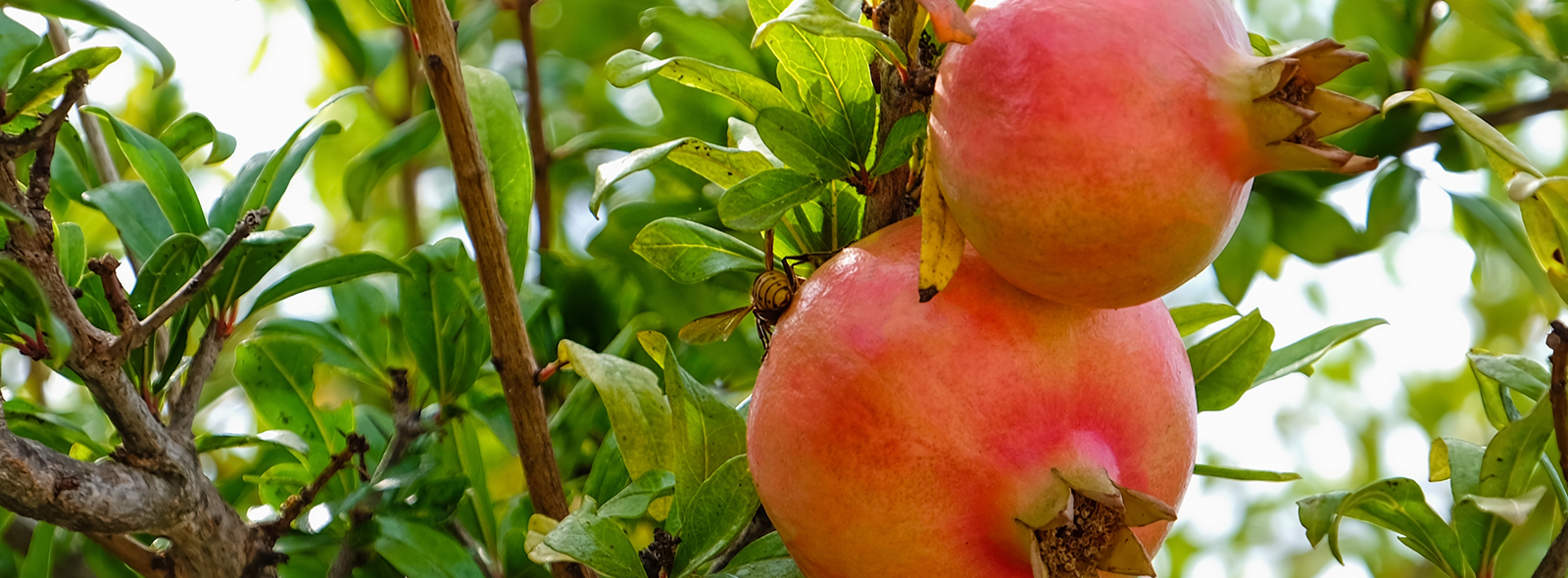
Source fruit trees from our local farms here in Melbourne.

Search through our varieties of pomegranate trees.

We give the best tips and tricks for your fruit trees.

Get pomegranate trees delivered to your doorstep.
130 Old Geelong Rd
Hoppers Crossing
VIC 3029
Monday - Saturday: 7 am–5 pm
Sunday: 10 am–3 pm
These hours are subject to change on public holidays

Pomegranate trees are tough and adaptable, making them well-suited to the sometimes unpredictable conditions of Melbourne. They can be grown in most types of soil but prefer well-drained soil high in organic mulch. Mulching around the tree's base will help conserve moisture and keep the roots cool in summer. The pomegranate's glossy, green leaves should be pruned annually to encourage new growth and prevent the formation of weak, leggy branches. With care and attention, pomegranate trees will produce fruit for many years.

In Melbourne, pomegranate trees grow best in full sun and well-drained soil. They are also quite drought-tolerant once established. Pomegranates are relatively low-maintenance trees and do not require a lot of fertiliser or water. However, they do need some protection from frost when young. Once established, pomegranate trees are quite hardy and can tolerate extreme heat and cold.

Melbourne gardeners interested in planting pomegranate trees should wait until late spring or early summer. This ensures that the tree will have plenty of time to become established before the hot, dry weather arrives. Pomegranate trees need well-drained soil and full sun, so it is important to choose a spot in the garden that meets these requirements.

The lifespan of a pomegranate tree varies depending on the species and growing conditions. Some pomegranate trees can live for over 200 years, while others may only live for 10-15 years. A pomegranate tree can provide many years of fruit production and enjoyment with proper care.
Pomegranate trees are a lovely addition to any garden, with their glossy leaves and vibrant fruit. Though they can grow quite large, pomegranates can also be successfully grown in pots. When choosing a pot, selecting one large enough to accommodate the tree's roots is important. The pot should also have drainage holes to prevent the roots from sitting in water. Once you have selected an appropriate pot, fill it with a well-draining potting mix and water thoroughly. Place the pot in a sunny spot, and water regularly to keep the soil moist but not soggy. With a little care, your pomegranate tree will thrive in its new home.
Pomegranate plants take about three to four years to mature and bear fruit. Once the plant produces fruit, it will continue for many years. Each pomegranate plant will have around 50 to 60 fruits each year. The exact amount of time it takes for a pomegranate plant to bear fruit will depend on the conditions where it is growing and the variety of pomegranates. Some pomegranates will mature faster than others and have better fruit quality. In general, however, most pomegranates have fleshy seeds that will begin bearing fruit within three to four years after they are planted.
While they typically reach peak ripeness when still on the tree, it is possible to ripen pomegranates off it. To do so, start by placing the pomegranates in a warm location out of direct sunlight. Once they have been in this location for a few days, check them regularly for ripeness. To test for ripeness, gently squeeze the fruit; if it yields to pressure, it is ready to eat. Once ripe, pomegranates can be stored in the refrigerator for up to two weeks. So if you find yourself with unripe pomegranates, don't despair—with a little patience, you can enjoy them at their best.
Each pomegranate contains hundreds of soft seeds surrounded by a juicy, fleshy coating. This sweet and tart fruit is a favourite of many people, but it can also attract fruit flies. A fruit fly is a tiny insect drawn to the sugars in ripe fruits. They lay their eggs inside the fruit, and the larvae feed on the flesh. This can cause the fruit to rot and can reduce the tree's yield. To prevent fruit flies from infesting your pomegranate tree, keep the area around the tree clean and free of debris. Prune away any overripe or damaged fruit, and immediately pick up fallen fruit from the ground. You can also try using traps baited with fermenting fruit or cider vinegar to catch and remove the pests.








